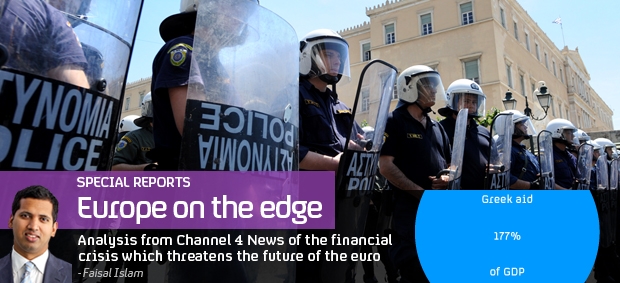Spain slashes budget to meet bailout terms
The Spanish government unveils plans to radically reduce departmental budgets while protecting pensions to pave the way for another bailout from the EU.
Madrid is anxious to impose its own new round of austerity measures on the country in the budget for 2013 to avoid having conditions foisted upon it by Brussels if it decides to request a second bailout to prop up its ailing economy.
While the Spanish government has not yet confirmed plans to seek more help, following the receipt of aid of up to 100bn euros for the country’s banks, Prime Minister Mariano Rajoy has admitted that – if borrowing costs remained “too high for too long” – “I can assure you 100 per cent that I would ask for this bailout”.
Deputy Prime Minister Soraya Saenz de Santamaria told a news conference that next year’s budget would focus on cutting spending rather than increasing taxes and the government would pass a raft of new laws to rescue the economy in the coming months – including a reform of the pension system – one of its most expensive costs – before the end of the year.
Emphasis on cuts – not taxes
Key elements include a further 8.9 per cent average cut in departmental spending, a freeze in public-sector pay for the third year in a row and a 20 per cent tax on lottery wins above 2,500 euros (£2,000).
However, Ms Saenz de Santamaria pledged to increase pensions by using reserves, while interest repayments would be stepped up. Tax rises would account for less than half the savings, she said, the majority coming from spending cuts.
The announcement of further cuts on a country already reeling from two years of public-sector wage freezes and a 25 per cent unemployment rate is expected to fuel yet more angry protests following those staged close to the parliament building in Madrid on Tuesday and Wednesday – although the decision to protect pensions may ease the anger.
But Mr Rajoy knows there is little – if any – alternative if the country is to drag itself out of a downward economic spiral, with borrowing costs rising with each new piece of bad financial news.
Figures released on Tuesday suggested the eurozone’s fourth-largest economy would miss its target to reduce its public deficit to 6.3 per cent of gross domestic product this year (the target is 4.5 per cent next year), and on Wednesday its central bank said the economy continued to contract sharply in the third quarter.
‘Unsustainable’ borrowing rate
And commentators say the prospects of reversing that are bleak, with economic output continuing to plunge.
On Wednesday the yield on Spain’s 10-year bond – a measure of the cost of borrowing – rose to 6 per cent, a level regarded as unsustainable in the medium term – but fell slightly leading up to Thursday’s announcement.
The deputy prime minister said: “This is a crisis budget aimed at emerging from the crisis… In this budget there is a larger adjustment of spending than revenue.”
The aid being dangled in front of Spain and other struggling eurozone countries is in the form of a programme in which the European Central Bank buys its bonds in an effort to peg the country’s borrowing costs.
Mr Rajoy knows the measures would come with stringent conditions, so he is believed to be trying to pre-empt those – and a public perception of outside interference – by introducing his own strict austerity package.
Instead of actually using financial aid to fund government spending commitments (as in Greece), the money from the bond purchase would be used to curb government borrowing costs and keep them sustainable.
However, recipient countries would need to agree to close scrutiny of its reforms and austerity programme by the ECB, the EU and International Monetary Fund.
Economy Minister Luis de Guindos said the government was still analysing the potential conditions.
The budget for 2012 was delayed until after the general election last November in which Mr Rajoy’s People’s Party ousted the Socialist regime.
